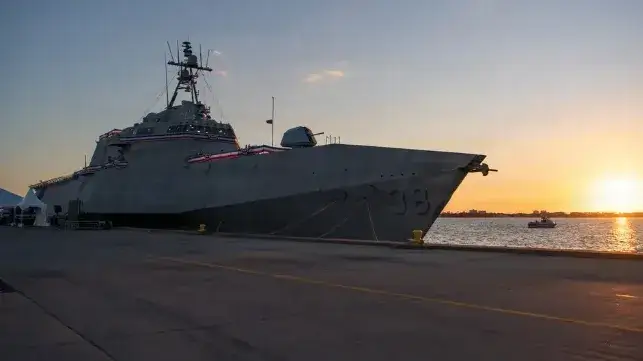U.S. Navy Takes Delivery of Last Independence-Class Littoral Combat Ship

The U.S. Navy has commissioned USS Pierre, its very last Independence-class Littoral Combat Ship, bringing a challenging acquisition program one step closer to a close. Only one Freedom-class LCS is still pending delivery.
"The commissioning of USS Pierre marks an important moment for the Fleet. President Trump is committed to restoring our shipbuilding capacity because he knows that to be a superpower, one must be a seapower," said Secretary of the Navy John Phelan. "This ship represents the skill, dedication, and craftsmanship of the builders, yard workers, and industry partners who brought her from concept to keel commissioning."
The final hull has been a long time coming. Design of the Independence-class formally began in 2004, in parallel with the swappable "mission packages" that the ships were supposed to carry interchangeably. The Pentagon opted not to down-select to a single ship design and yard, so there would be two classes: Austal built its aluminum trimaran Independence-class "variant," and Fincantieri/Lockheed built their steel monohull Freedom-class design as well. The choice to build two classes was made in order to secure political support for the project, former Navy Undersecretary Robert Work told ProPublica in 2023.
From a capability standpoint, the two designs came under fire from traditional navalists for their comparatively low survivability and lethality. The hulls were designed for high speeds and shallow draft, allowing for swift operations near shore. The unusually high speed requirement meant engineering tradeoffs for armor and armament, and they were not designed to the same standard as other combatants for resistance to shock. When it came time for shock trials, the Navy performed the blasts at reduced intensity to avoid damage to the ships, and halted tests for the Freedom-class series before reaching one-third of rated force. In 2016, official concerns were raised about whether they could survive in combat.
In service, the Freedom-class quickly developed a reputation for mechanical issues, particularly a faulty gearbox design in the propulsion system. The class was assigned to tow a sonar array for antisubmarine warfare, but the sonar package failed to develop and was canceled in 2022. Even when all systems were functioning, the Freedom-class vessels were "noisy as an aircraft carrier," and that created challenges for sonar work, according to then-CNO Adm. Mike Gilday. Lacking a mission for the Freedom-class, the Navy decommissioned first-in-class LCS USS Freedom in 2021, 12 years ahead of her planned end of life. In 2022, Navy leadership tried to decommission all nine Freedom-class hulls then in service, the youngest of which had been active for less than three years; ultimately five were removed from the fleet.
The Independence-class has had fewer public issues. Beginning in 2019, structural defects resulting in hull cracking were found on at least six ships, according to Military Times - forcing low speed and sea state restrictions for at least one vessel. The issue was above the waterline only, and was fixed in later production with heavier hull plating in certain areas. Retrofits and repairs were planned for in-service vessels. At sea, the vessels have proven useful for interdictions and freedom of navigation patrols. In addition, the mine countermeasures package that the Independence-class is assigned to carry has reached initial operational capability, and deployed for the first time in 2025.
For both classes, a contractor-centric service model initially drove up operating costs near to full-sized destroyer levels, according to U.S. Navy budget data. In recent years the service has been working to shift more responsibility for repairs in-house and empower the crew to fix broken gear.
The arrival of the last Independence-class hull also marks the end of a large order series for Austal USA's aluminum construction line. The all-aluminum Spearhead-class fast transport and a medical-ship version are still in production. In the meantime, Austal has started up a large and growing business in all-steel construction, which is rapidly expanding.
